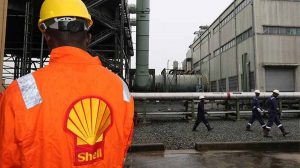Shell Petroleum Development Company (SPDC), Shell International United Kingdom and Shell International Exploration and Production BV (SIE&P), Netherlands, will be heading to the appeal court in the Owerri division on Thursday to begin the process of trying to convince an appeal panel to upturn an N800 billion or $1.95 billion judgement debt that has entered the records book as the largest award ever proclaimed by any judge in the history of Nigeria.

Shell got into trouble over its operations after it was taken to court for an oil spill that occurred on swamp farmlands in Egbalor, Ebubu, Eleme Local Government Area of Rivers State. The judgement against SPDC and its parent companies in the UK and Netherlands was obtained by some 88 persons in November 2020 from a Federal High Court in Owerri over spillage on their fishing facilities in Ejalawa community in Oken-Ogogu swamp farmlands.
Tijani G. Ringim, judge of the Federal High Court, Owerri, Imo State, had in the judgement last year held Shell Nigeria, Shell International Exploration and Production BV (SIE&P) and the Nigerian National Petroleum Corporation (NNPC) liable for the spill and granted the plaintiff the relief in the sum of N800 billion.
Shell has played it cool since the judgement was passed in 2020 and has not made any statement except to pursue an appeal with many analysts suggesting that it was ready for a slugfest by taking this appeal route and would be ready to go as far as the Supreme Court in search of an outcome it would be comfortable with.
It is not clear what the thinking is at Shell’s global headquarters regarding this case given the size of the judgement debt. For a company that has been looking to exit assets in troubled areas of operations in Nigeria, with some assets already in the market for which it is looking to realise $3 billion, some issues have come up relating to what impact this ongoing dispute might have on bidders’ attitude to potential after sale liabilities.
International oil companies (IOCs) have often been subject to rigorous scrutiny especially in relation to how they treat host communities. Shell has operated in Nigeria for decades and it has not really been regarded as a shining example in the treatment of the communities where it operates.
Accusations have often been levelled by drawing comparison with the way Shell and other IOCs carry on their operations in Nigeria and in other jurisdictions. To this many would say IOCs take advantage of the prevailing corrupt environment that allows them to get away with murder by just extracting host communities resources and leaving them high and dry.
The $1.95 billion judgement is huge. But it is not only the cash involved, Shell has a responsibility to also clean up and it is thought in some quarters that this could be something that it is trying to avoid. Indeed, the plaintiffs in the case had sought for another order directing Shell to depollute and rehabilitate the destroyed farmland, ponds and agricultural products.
The judge in delivering judgement obliged them when he said: “The defendants shall promptly and expeditiously remediate the land of the plaintiffs to its International Agricultural Soil (IAS). The first and third defendant shall depollute and rehabilitate the farms and more particularly the fish ponds, of the plaintiffs.”
It is, therefore, not just the N800 billion compensation judgement, there is even more that the judgement requires of Shell. For one though, it exposes the kind of relationship that has existed between oil producers and their host communities, especially IOCs who had been exploiting Nigeria’s oil for decades with the backing of the might of the federal government, in what one legal expert called ‘legal theft’ of resources of the Niger Delta.
The judge who delivered the judgement said pipelines were laid and abandoned, which can be interpreted to mean that once the IOC laid the pipes and oil flowed through them to where they were needed, what happened thereafter was not of concern to the oil producers.
When the appeal opens on Thursday and gets going it is likely to draw more attention both to the size of the judgement and the issues on which the judgement is based.
But a number of people have become vocal on this matter, including Madaki Ameh, a former Shell lawyer who at different times was head, land acquisition and claims and head, security planning and strategy.
Madaki said he is shocked that the environmental practises of Shell in Nigeria are completely out of tune with the company’s practises in other parts of the globe where the company operates, and he called on the board of Shell International to live up to its global posture as a fair operator and prevail on SPDC, its Nigerian subsidiary, to do justice to the impacted community.
With regards to the farmland in Egbalor, Ebubu, one international political and economic risk analyst in London told Business A.M. that he was surprised that Shell did not try to resolve it with the host communities before it got to the point of a near $2 billion judgement being made against it.







